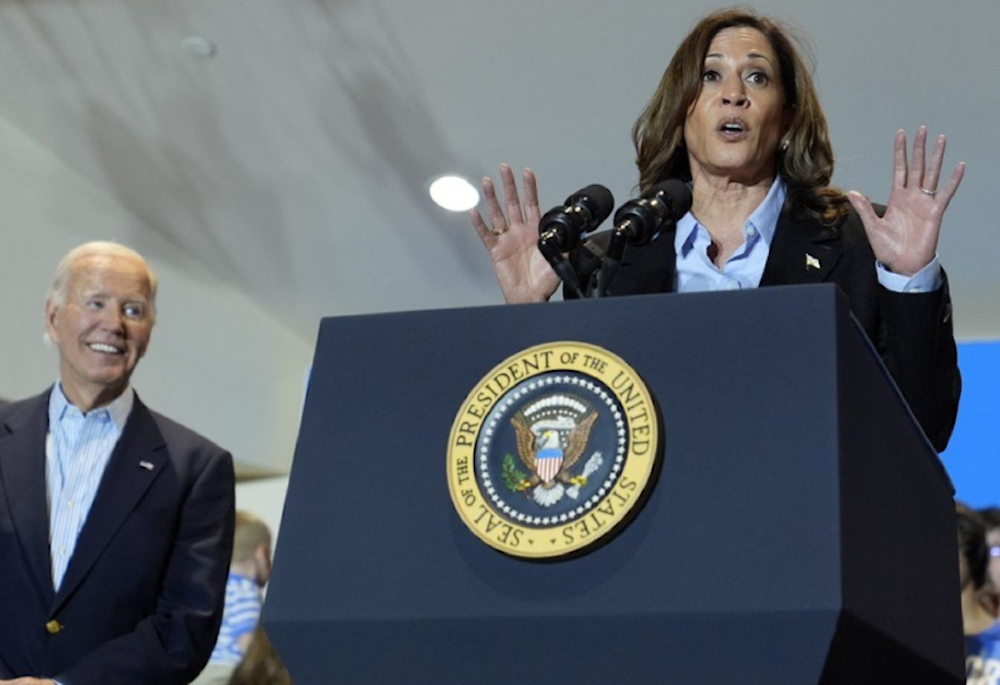US, through Harris, deals mighty 'steel' blow to Japan
Since it was unveiled in December, Tokyo-based Nippon Steel's proposal to purchase US Steel has been contested by the Pittsburgh-based United Steelworkers union.
-

US President Joe Biden and Democratic presidential nominee Vice-President Kamala Harris campaign at IBEW Local Union #5 union hall in Pittsburgh on Sept. 2, 2024. (AP)
Vice President Kamala Harris said US Steel should remain in the hands of American owners, laying another blow to Japanese firm Nippon Steel's $15 billion bid to buy the renowned American steelmaker.
During a campaign rally in Pittsburgh on Monday, drawing applause from the crowd, Harris said, “U.S. Steel should remain American-owned and American-operated."
Since it was unveiled in December, Tokyo-based Nippon Steel's proposal to purchase US Steel has been contested by the Pittsburgh-based United Steelworkers union.
The union claimed that a foreign corporation's takeover of an American steel business would jeopardize national security and questioned Nippon Steel's promises not to cut off people or close operations.
In the last 8 months, both President Biden and Republican presidential contender Donald Trump have expressed dissatisfaction with foreign ownership of US Steel.
Union officials and Nippon Steel executives had been waiting to see what Harris' position would be. The United Steelworkers hailed her comments, claiming that it would assist protect national security and union employment.
Nippon Steel, on its part, expressed confidence that the combination will strengthen U.S. Steel and the American steel sector, stating "We believe that a fair and objective regulatory review process will support this outcome."
Nippon Steel has been banking that conversations will continue until the November presidential election, after which unions may have less political clout.
US presidents have the authority to ban some cross-border transactions based on national security concerns, however, the question is whether the acquisition spearheaded by Japan, a US ally, can be considered a threat.
Nippon Steel has gone to great pains to demonstrate that the merger will benefit both firms and their staff, as well as both countries.
The Japanese steelmaker has pledged billions of dollars in new investment in US Steel operations. In July, IBM announced the withdrawal from a long-standing joint venture in China, which may have raised concerns among US authorities.
A powerful interagency group, the Committee on Foreign Investment in the United States, is investigating the national security implications of Nippon Steel's request. For matters that need a thorough examination, the committee provides a recommendation to the president, who takes the ultimate decision.
White House pushing Harris to forefront of foreign affairs
Since President Joe Biden's decision not to run for reelection, the White House has increased its emphasis on Vice President Kamala Harris' role in foreign affairs, according to a POLITICO study of transcripts and other official records.
According to POLITICO, mentioning Harris repeatedly, or any other vice president, indicates an attempt to shore up her credentials as she faces doubts about her capacity to manage foreign affairs and faces an experienced opponent, former President Donald Trump.
According to John Hannah, a foreign policy assistant in both Democratic and Republican administrations who formerly worked as Vice President Dick Cheney's national security advisor, the White House looks to be attempting to puff up a pretty modest international policy background.
Hannah, a senior fellow at the Jewish Institute for National Security of America, stated that "the flurry of announcements to highlight her deepened involvement in several recent events is clearly of a piece with that effort to play catch up and do the best they can to plug what is obviously a potential weakness."
Prior to becoming vice president, Harris had limited foreign policy expertise as a member of the Senate Intelligence and Homeland Security committees and was not regarded as a big international policy figure on Capitol Hill.

 4 Min Read
4 Min Read








